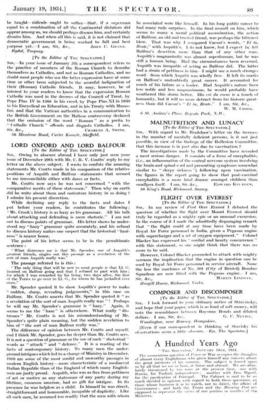LORD OXFORD AND LORD BALFOUR
[To the Editor of THE SPECTATOR.] Sut,7-0wing to absence abroad I have only just seen your
issue of December 29th with Mr. C. R. V. Coutts' reply to my letter on the above subject. I wrote to confute the amazing statements Mr. Coutts made in his comparison-of the relative positions of Asquith and Balfour—statements that seemed to me irreconcilable either with dates or facts.
Mr. Coutts now says he was not concerned " with the comparative merits of these statesmen." Then why on earth did he write about them and caricature history in so doing I admire his present discretion.
While declining any reply to the facts and dates I put before your readers, he contributes the following : "Mr. Crook's history is as hazy as his grammar. All his talk about attacking and defending is mere rhetoric." I am not out to discuss points of grammar. His letter shows he under- stood my "hazy" grammar quite accurately, and his refusal to discuss history makes one suspect that the historical "hazi- ness" is nearer home.
The point of his letter seems to be in the penultimate sentence :
" What distresses me is that Mr. Spender, one of Asquith's greatest friends, singles out this passage as a revelation of the sort of man Asquith really was."
The passage referred to is this :
" The only.thing that will be new to most People is that LI. O. insisted on Balfour going and that I refused to part with him ; for which I was rewarded by his being, two days after, the first of the Tories to go over to Ll. G., for whom he has jackalled ever since."
Mr. Spender quoted it to show Asquith's power to make " sudden, sharp, revealing' judgements," in this case on Balfour. Mr. Coutts asserts that Mr. Spender quoted it " as a revelation of the sort of man Asquith really was " ! Perhaps he will say Mr. Spender's grammar is hazy." Again, it seems to me the "haze" is otherwhere. What really "dis- tresses " Mr. Coutts is not his misunderstanding of Mr. Spender's quite plain meaning, but the sudden revelation to him of " the sort of man Balfour really was."
The difference of opinion between Mr. Coutts and myself', and I think Mr. Spender, goes far deeper than Mr. Coutts seek. It is not a question of grammar or the use of such rhetorical " words as " attack " and " defence." It is a reading of the facts of contemporary history. To many mei), the under- ground intrigues which led to a change of Ministry in December, 7916 arc some of the most sordid and unworthy passages in modern English history—more characteristic of a mediaeval Italian Republic than of the England of which many English- men are justly proud. : Asquith, who was as free from pettiness of act or motive as any statesman of any party during my lifetime, consensu omnium; had no gift for intrigue. In. its presence he was helpless as a child. In himself he was direct, straightforward and honourable, incapable of duplicity. Like all such men, he assumed too readily that the men with whom
he associated were like himself. In his long public career he had many-rude surprises. In the final assault on him, which 'seems to many a moral political assassination, the action of Balfour, an old and trusted friend, was perhaps the bitterest blow. That was why I compared Caesar's words, " Et tu, Brute," with Asquith's. I do not know, but I expect he felt Balftitir's desertion more than that of any other man. Asquith's magnanimity was almost superhuman, but he was still a human being. Had the circumstances been reversed, Asquith was incapable of acting as Balfour did. The latter had a strain of pettiness in him—I might use a much stronger word-from which Asquith was wholly free. It left its marks on Balfour's undoubtedly great career. It accounted for much of his failure as a leader. Had Asquith's nature been less noble and less magnanimous, he would probably have weathered this storm better. His eri du (wear is a touch of huinanity, but it will no more detract from his historic great-
ness than did Caesar's " El In, Brute."- I ant, Sir, &e., •
W. M. CROOK.
0 St. Andreafs Place, Regents Park, IV .Ii•








































 Previous page
Previous page